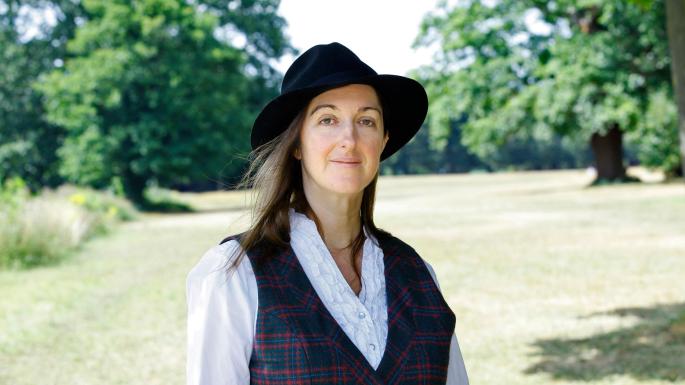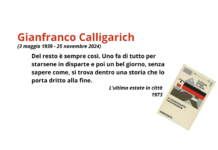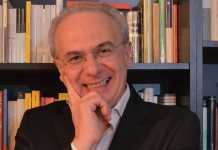You may also read the Italian version of this interview.
The literary world at large began to notice Frances Hardinge three years ago, when the British author won the Costa Medal Award for her then latest book The Lie Tree. She has been the first children books’ author to have been nominated since Philip Pullman.
I began The Lie Tree with good, but somehow subdued expectations. I expected a metaphorical parable in the suave tones usually meant for children. What I found instead was a gritty, coal-smeared world of deceit, mistrust, and power, where the curiosity of a teenager girl might well risk her life and maybe even her soul.
While the whole idea of the Tree was engrossing in its own Faustian terms – the arboreal freak grants glimpses of some universal truth but only if you are ready to slander something you care about – what I found truly astonishing was the setting.
There is a sense of historical accuracy here that goes well beyond the superficial: The Lie Tree, the only philosophy of science book for young people I know, can only make sense in a post-Darwin England, as it portraits the struggle of an age coming to terms with a new paradigm. And yet, this book has no didactic tone, and it is in fact a joy to read. There are action, games of detection, and a language that never stays put but coils around the page like some chryselephantine wonder.
Be warned: Frances Hardinge writes for children and young adults. Or so we are told, by herself, nonetheless. That is indeed a great relief, for in this way her superb use of the fantastic can somehow be forgiven by the literary world.
In fact, to introduce Frances Hardinge to Italian readers is an embarrassing endeavor. Especially if you want to justify her as a fantasy author. It is awkward in the way it must have been introducing Picasso to caricature artists. Apparently what they do is the same, a stubborn misuse of human anatomy, but their purpose is entirely different.
In Hardinge’s books the fantastic is not just used to impress the reader with a volatile sense of wonderment. Instead, it claws in us a sense of marvel that transcends into self-awareness, as all the protagonists of her books’ learn how their surrounding shape them, and how to exist in spite of them. All her novels are historical precisely because they recognize how history influences us. And yet they are also ‘fantasies’ for only imagination can give us the internal tools to shape our own soul
Italian publisher Mondadori has recently published some of her latest works after The Lie Tree, namely A Skinfull of Our Shadows, and Cuckoo Song.
The first one, set in civil war England, talks about a noble family which gives to its scions not only power and lands, but literally the souls of their ancestors. A chilling sometimes brutal tale of family burdens, and – again – a fantastic historical piece.
As for Cuckoo Song, it is simply one of the most exquisite nightmares I ever read. If, like me, you think that Tim Burton has gone flaccid in recent years, if you wish that Miyazaki had written a novel as awe inspiring as Spirited Away, set in 1900s England with the old Burtonesque spirit, well, you are in for a treat.
Should I be obliged to summarize it I would say (spoilers ahead!) that Cuckoo Song is about a doll that has to learn how to become truly alive. In spite of her Edwardian pseudo-parents, of her tight post Victorian upbringing, of her sister’s hatred, of her own immaturity, Triss-Trista has to become human: even more human than the girl she was fashioned after.
If that is still not enough for you –but seriously, what’s wrong with you?– I would throw in the deal: an upside down town; murderous silent movies; a personal snow-storm; screaming dolls; and much, much more.
Since we are beginning a New Year I and my associates at PULP Libri feel exceedingly generous and so we have asked Frances to answer some questions of our own making. Be quiet now, for she is soft spoken and must be listened to very carefully.
You said in an interview that most of your historical books are about political “aftermaths”. Can you explain this choice?
I’m fascinated by times of dramatic change, and how well people deal with them. Cuckoo Song, The Lie Tree and A Skinfull of Shadows are all set in historical periods when people felt as though their familiar world had died, and they’d been plunged into a new universe where the old rules didn’t work any more. At times like that, some people are able to accept the change, adapt and look for new opportunities. Others don’t cope well at all, and cling to old rules, ways and beliefs. I’m always interested in anything that tests and reveals character, and that’s one reason why my settings often involve times when people are dealing with intense change – revolutions, transitions or aftermaths.
The revolution or change doesn’t have to be political. In The Lie Tree, the shockwave shaking society to its core is intellectual and spiritual. The book is set less than a decade after the publication of Charles Darwin’s On the Origin of Species, and in the wake of geologists discovering that the world was older than previous thought, and indeed old enough for evolution to be a credible theory. No shots are fired in this revolution of the mind, but these revelations turned many people’s worlds upside down. Scientific evidence had called the literal truth of the Bible into question, and this left people reeling, and uncertain of their place in the cosmos.
Needless to say, these times of change are also fun to research and interesting to write about!
Some people are addicted to coffee, cigarettes, drugs. Some others, it seems, to metaphors. Can you tell us about your addiction, how it came about and in what way you cope with it?
Yes, I do have to plead guilty to that! Every author has their flaws and weaknesses, and mine is that I get carried away playing games with words. There’s something intoxicating about the music of words, and the way they spark off each other if you hurl them into unusual combinations. Metaphors are particularly magical. They lend vividness to a physical description, can make abstract ideas more comprehensible, and transform the ordinary into something startling and new.
I naturally think in metaphors, and I don’t seem to be able to help it. Even while I’m talking, similes and metaphors creep into my speech. When I’m writing, I often don’t even realize how many I’ve used. Every edit involves purging a load of metaphors. Thankfully my editor and the members of my writers’ groups are good at being strict with me, and getting me to cull the herd!
Just don’t cull them too much! The beauty of your language is one of the reasons I would re-read your books until I wear out. Changing subject: one of your favorite words to describe your work is “odd”, to the point you confessed you collect “oddities” that will later feed your inspiration. Can you tell us about this word and what it represents for you?
I’m aware that my stories tend to be a little… non-standard. I have this entrenched fear of telling a story that has been already told, or falling into cliché, or repeating myself, or recycling lazy tropes. As a result of this fear, a part of my brain is always compulsively tweaking at my concepts and looking for ways to make them more interesting.
When brainstorming the setting for A Face Like Glass, which involves a labyrinthine underground city with unreliable topology, glowing carnivorous plants, mind-control perfumes, divination by theft, exploding cheeses and contagious map-induced insanity, I told a good friend that I was worried that the whole thing might be too derivative. She gave me a long look, and said: “No, Frances. It’s not derivative. It’s whacked out.”
It’s also certainly true that oddities help to spark my imagination. Peculiar incidents and customs, strange turns of phrase, weird legends, weirder people… all of those inspire me. Glamour doesn’t intrigue me. Oddness does.
My favorite thing in your work is possibly ‘reversal’ in characterization. You introduce characters who seem to be totally positive, and yet later on we find them to be ‘villains’, like Josh in Verdigris Deep. My favorite is Violet in Cuckoo’s song. At the start she is portrayed as a somehow cold and callous woman, and then she becomes easily one of the most likeable characters in your books. Can you elaborate on how this ‘reversal’ works from your perspective?
People are infinitely complex and mysterious. We can never truly know anybody, not even ourselves. We’re like pieces of music, ever changing and developing, and we only catch a few notes of each other’s sonatas. The lady I chat to at the gym seems pleasant and level-headed, but I’m only catching a brief refrain from her melody. Elsewhere in her sonata there may be a sinister waltz, or a heroic march… or both.
From an early age I was fascinated by detective stories, where nobody was what they seemed, everyone had secrets, and homicidal intent might be lurking behind any friendly face. I also encountered the films of Alfred Hitchcock at a young and impressionable age. His films are full of shocks, betrayals and misdirection, harmless-seeming people and places suddenly become menacing. Even though I found these ideas frightening when I was young, they were also exciting. The ordinary might become extraordinary without warning. The familiar might peel back to show a dark and dangerous world.
At heart, though, I’m an optimist when it comes to my species. People are endlessly surprising, and quite often the surprise isn’t a bad one. Someone that we find annoying, boring, despicable or jarring may turn out to have unsuspected reserves of kindness, moral courage, wisdom or strength of will.
In the case of Violet, I was very keen to make sure that the reader’s impression of her would change during the course of the book. Whenever I showed a chapter of Cuckoo Song to my writer’s group, I asked the other members what they felt about Triss, Pen and Violet, how sympathetic they felt each of them was, and whether this had changed since the last chapter. I was playing complicated games with reader sympathy, and I wanted to know whether I was getting the balance right at every stage!
Someone said: “Writing for a particular audience is a matter of what kind of reader you leave out. Good books for adults leave children out; good books for children they leave out no one”. Can you tell us about your relationship with your more mature readers?
My adult readers know that they’re not my top priority, but they don’t seem to mind. I’m certainly happy to discover my books seem to have some cross-over appeal. I’m very much in favor of people reading whatever they enjoy, and personally I read quite a lot of children’s and YA fiction.
One of the joys of a good book is that, when you come back to it at different times in your life, it’s a different book. My favorite book when I was ten was Watership Down. It’s still a wonderful read as an adult, but now I notice and appreciate different things, like the crafting of the mythology and the invented words.
Talking about crafting words, the titles of your books are truly magical. How do they come about?
When I was young, I always assumed that the title of a book was decided first, before the book was written. Now I know that the title is often still being debated while the book is being written, and is sometimes only settled upon after the book itself is completed!
I always have a ‘working title’ when I write, but I am now used to the idea that it might well change. None of my first four books ended up with their working title! In each case, my publishers felt that my proposed title wasn’t sufficiently striking. (Looking back, I think they were right about this.) They asked me to come up with a lot more title ideas, and suggested some of their own, and after a lot of debate and brainstorming we came up with titles that everyone was happy with.
A Face Like Glass, Cuckoo Song and The Lie Tree did end up with their original working titles. A Skinful of Shadows was originally Cold Inheritance, but I think the final title is better! In translation my books have sprouted many other titles, some of them in languages I can’t read..
We take our hat off at you.
And we at you! Thanks for your patience and availability
…
If you are interested in Frances’ work, you can visit her website at http://www.franceshardinge.com/ and look for more of her books.







